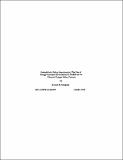| dc.contributor.author | Margolis, Robert M. | en_US |
| dc.contributor.other | Massachusetts Institute of Technology. Center for Energy and Environmental Policy Research. | en_US |
| dc.date.accessioned | 2009-12-15T23:59:46Z | |
| dc.date.available | 2009-12-15T23:59:46Z | |
| dc.date.issued | 1992 | en_US |
| dc.identifier | 92012 | en_US |
| dc.identifier.uri | http://hdl.handle.net/1721.1/50202 | |
| dc.description.abstract | This paper uses the Edmonds-Reilly model to explore an alternative approach for using energy-economic-environmental models when analyzing future CO2 emissions. This approach--conducting probabilistic policy experiments--can be used to investigate the effectiveness of various policy options in the context of uncertainty. the analysis builds on work by Nordhaus and Yohe (1983) and Edmonds et al. (1986). A key feature of using a probabilistic approach is that it offers both analysts and policymakers an opportunity to move away from arguing about which scenario is the "right," best guess scenario, and towards a discussion of which strategies are effective across a wide range of possible futures. this paper both develops a methodology for conducting probabilistic policy experiments and presents the results of 5 preliminary experiments using this approach. | en_US |
| dc.description.sponsorship | Supported by the MIT Center for Energy and Environmental Policy Research, and the MIT Joint Program on the Science and Policy of Global Change. | en_US |
| dc.format.extent | 32 p | en_US |
| dc.publisher | MIT Center for Energy and Environmental Policy Research | en_US |
| dc.relation.ispartofseries | MIT-CEEPR (Series) ; 92-012WP. | en_US |
| dc.title | Probabilistic policy experiments : the use of energy-economic-environmental models in the climate change policy process | en_US |
| dc.type | Working Paper | en_US |
| dc.identifier.oclc | 35719924 | en_US |
